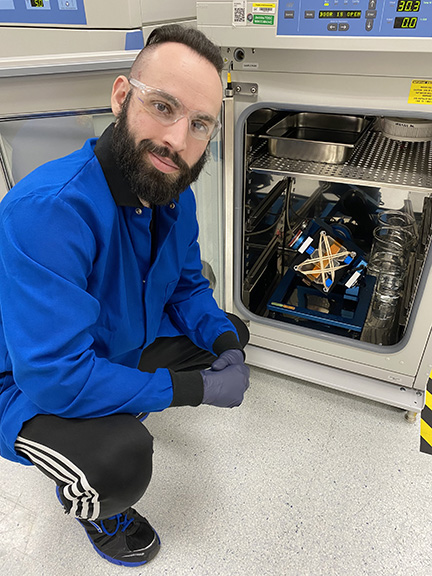Chris Ludtka, a Ph.D. candidate in the Josephine Allen Lab, received a National Institutes of Health (NIH) Ruth L. Kirschstein National Research Service Award (NRSA) Individual Predoctoral Fellowship for his project titled, Sex-Specific Angiogenic Responses of Vascular Cells to Simulated Microgravity.
The prestigious fellowship covers full tuition, stipend, and educational expenses. The award is intended to enable promising predoctoral students to obtain individualized, mentored research training from outstanding faculty sponsors while conducting dissertation research in scientific health-related fields relevant to the missions of the participating NIH Institutes and Centers. The proposed mentored research training must reflect the applicant’s dissertation research project and is expected to clearly enhance the individual’s potential to develop into a productive, independent research scientist. Ludtka’s mentor on the project is Dr. Josephine Allen, Genzyme Professor of Materials Science & Engineering.
The objective of this research proposal is to study the effects of simulated low gravity on two major types of cells found in the body – endothelial cells and macrophages – which are important for the growth and function of blood vessels. The study will investigate how these cells change in response to low gravity, while also assessing how those changes in response to gravity differ between male and female cells.
When creating artificial tissues or organs for medical purposes, one of the biggest challenges is ensuring proper blood supply to the tissue to provide nutrients and remove waste. Endothelial cells line the inside of blood vessels, while macrophages can help these cells to grow and are involved in the immune system. Previous research has shown that endothelial cells grown in both simulated and actual low gravity environments can form unique structures that do not develop the same way under normal gravity. In this case, simulated low gravity refers to small-scale biological reactors on the ground that mimic low gravity, while actual low gravity refers to spaceflight experiments such as those conducted on the International Space Station. Furthermore, researchers have also found that there are differences between male and female cells when it comes to blood vessels as well as the male and female circulatory systems in general, but this has frequently not been taken into account in research historically. As such, this research will provide insight into using simulated low gravity as an environment for growing tissues, the effects of some aspects of spaceflight on human biology, and the differences between men and women’s cell responses.
